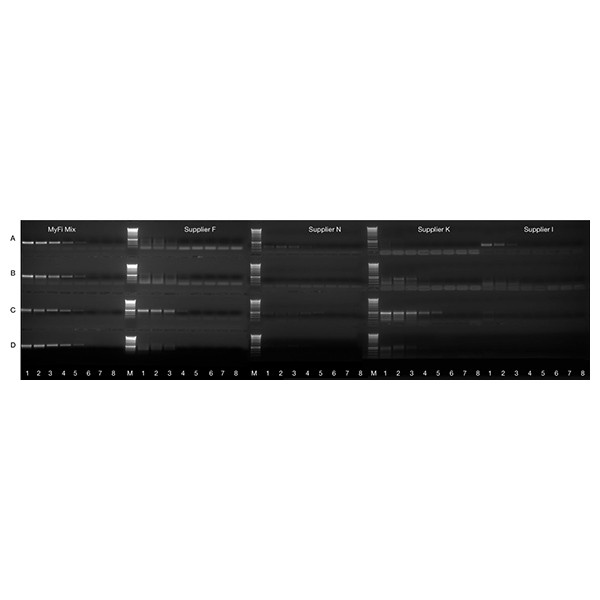Ordering
*link will take you to our exclusive distribution partner site
*link will take you to our exclusive distribution partner site
MyFi™ has been developed to give reliable amplification of targets up to 10 kb from challenging and complex targets. MyFi shows improved tolerance to PCR inhibitors, thereby enabling reliable detection from samples from which DNA is difficult to purify. Furthermore a unique buffer system and enzyme blend promote highly sensitive amplification, ideal for low-copy number targets. The proofreading ability of MyFi allows all PCR products to be cloned. The inclusion of MyTaq HS means MyFi Mix generates PCR products with 3’-A overhangs, which is perfect for TA cloning. MyFi Mix has the added convenience of room temperature reaction assembly, to avoid non-specific amplification and primer-dimer formation.
MyFi Mix is supplied as a mastermix that requires the addition of only template, primers and water, thereby reducing the number of pipetting steps during PCR set-up, for improved speed, throughput and assay reproducibility. The inclusion of dNTPs, MgCl2 and enhancers at optimal concentrations, helps eliminate the need for optimization, thereby saving on time, cost and making MyFi Mix well suited to automation.

Greater reliability with GC-rich DNA
A 525 bp fragment of the 62% GC-rich human epidermal growth factor receptor (EGFR) gene (A), a 750 bp fragment of the 64% GC-rich translation factor p64 (myc) gene (B), a 900 bp fragment of 43% GC-rich angiotensin II receptor type I (AGTR1) gene (C), a 1.2 kb fragment of 62% GC-rich EGFR gene (D) were amplified using MyFi DNA Polymerase and similar polymerases from other suppliers. A five-fold serial dilution of human genomic DNA (25 ng - 8 pg, 1.6 pg and 0 pg, Lanes 1-8 respectively) was used as template. Marker is HyperLadder 1kb (M). The results demonstrate that that MyFi delivers more reliable amplification of challenging targets.
|
Reagent |
100 Reactions |
500 Reactions |
|
MyFi Mix, 2x |
2 x 1.25 mL |
10 x 1.25 mL |
All components should be stored at -20°C upon receipt for optimum stability. Repeated freeze/thaw cycles should be avoided.
When stored under the recommended conditions and handled correctly, full activity is retained until the expiry date indicated on the outer box label.
Shipped on Dry Ice or Blue Ice.
| Observation | Recommended Solution(s) |
| No or low PCR yield | Enzyme concentration too low – increase the amount of enzyme in 0.5 U increments. |
| Primers degraded – check quality and age of the primers. | |
| Magnesium concentration too low – increase concentration in 0.25 mM increments with a starting concentration of 1.75 mM. | |
| Primer concentration not optimized. Titrate primer concentration (0.3-1 µM); ensuring that both primers have the same concentration. | |
| Template concentration too low – Increase concentration of template. | |
| Perform a positive control to ensure that the enzyme, dNTPs and buffers are not degraded and/or contaminated. | |
| Multiple Bands | Primer annealing temperature too low. Increase annealing temperature. Primer annealing should be at least 5°C below the calculated Tm of primers. |
| Prepare master mixes on ice or use a heat-activated polymerase. | |
| For problems with low specificity. Try adding 3% DMSO (not supplied) to improve specificity. | |
| Smearing or artifacts | Template concentration too high. Prepare serial dilutions of template. |
| Too many cycles. Reduce the cycle number by 3-5 to remove non-specific bands. | |
| Enzyme concentration too high - decrease the amount of enzyme in 0.5 U increments. | |
| Extension time too long. Reduce extension time in 0.5-1 minute increments. |
Please click here in order to request your sample. You will receive an email confirmation within two business days with delivery details.